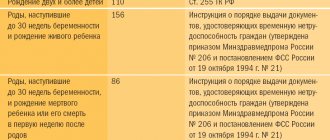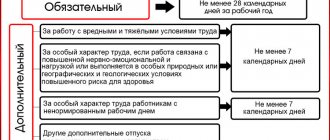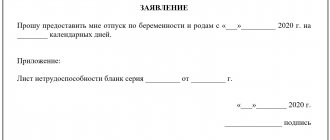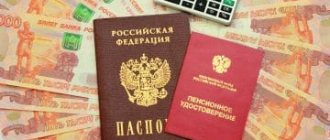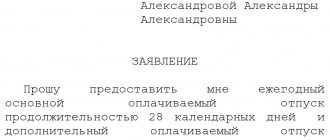There is no specific concept of public service in Russian legislation. In some works published by famous lawyers, public service means socially useful activities associated with professional implementation on the basis of government orders. Issues of public service are regulated by special regulations, as well as norms of constitutional, housing, labor, insurance, financial, pension and other branches of law. A large set of legal acts regulating certain aspects of this issue was introduced in 2021.
It is customary to classify civil servants as Russian citizens who hold positions in the civil service and, as a result, are endowed with a set of special rights and responsibilities. Civil servants perform the functions of various government bodies on a remunerated basis. According to the principle of separation of powers, civil servants are identified who hold positions in representative, executive, municipal, judicial, etc. bodies. authorities.
Legal innovations regarding vacations for this category of citizens came into force in 2021. Their key difference is the reduction in time allotted for rest.
The purpose of the reform was to ensure social equality between civil servants and other Russian citizens, as well as to unify procedures for granting leave and simplify the associated paperwork in government bodies.
Legislation on leave of state civil servants
As follows from the content of the changes made to the text of Federal Law No. 79-FZ of July 27, 2004, the provisions regulating the procedure for granting paid annual leave (main as well as additional) to civil servants have now been clarified. By virtue of clause 5 of Article 5 of Federal Law No. 25-FZ of 03/02/2007, the key conditions for remuneration for work and social guarantees for municipal and state employees are balanced.
According to the introduced legislative norms, in 2021, civil servants, in addition to the main annual leave, are provided with additional leaves due to:
- length of service (clause 5 of Article 46 of Law No. 79-FZ of July 27, 2004);
- the presence of irregular working hours (part 4 of article 45 of Law No. 79-FZ of July 27, 2004);
- work in harmful and dangerous conditions (clause 7 of article 46 of Law No. 79-FZ of July 27, 2004);
- work in the Far North/equalized areas (clause 7, article 46 of Law No. 79-FZ of July 27, 2004).
The total duration of vacation for each employee should be recalculated annually, since the number of vacation days is subject to change (in particular, due to changes in the length of service in the civil service).
Duration
In accordance with the implemented state policy in the field of providing leave to civil servants, specialists with less than 1 year of experience can take advantage of paid leave, the duration of which is at least 30 days. However, for the majority of civil servants, vacation of 31-40 days is guaranteed.
The duration of the main vacation is established by Article 46 of Law No. 79-FZ of July 27, 2004. In particular, part 3 of this article stipulates that civil servants are entitled to longer (30 days) annual leave than employees of commercial structures (the standard duration of their leave is 28 days).
In 2021, the imbalance in determining the duration of rest for high-ranking categories of civil servants and ordinary personnel has been eliminated. If previously management employees were guaranteed leave, the duration of which was 5 days longer than that of other specialists, now a single duration of basic leave has been determined for all groups of civil servants - 30 days.
Vacations for civil servants are provided in accordance with a pre-approved schedule (Article 123 of the Labor Code of the Russian Federation). Among the exceptions in this case are situations when a civil servant expresses a desire to use the next vacation while his wife is on maternity leave. In such circumstances, employers are required to take into account the wishes of employees and ensure that the organization's vacation schedule is adjusted accordingly.
A minimum number of days has been established - 28, which an employee must use in the current year (the remaining number of vacation days, at the request of the employee, can be replaced by financial compensation). At the same time, the law allows the vacation to be divided into parts, based on the fact that one of the parts cannot be less than 14 days.
Vacation schedule
As mentioned earlier, annual paid leave must be provided to a civil servant annually in accordance with the vacation schedule approved by the employer’s representative. Article 123 of the Labor Code of the Russian Federation states that the order of granting paid vacations is determined annually in accordance with the vacation schedule approved by the employer, taking into account the opinion of the elected body of the primary trade union organization no later than two weeks before the start of the calendar year in the manner established by Art. 372 of the Labor Code of the Russian Federation for the adoption of local regulations.
The vacation schedule is mandatory for both the employer and the employee. At the same time, the employee must be notified of the start time of the vacation against signature no later than two weeks before its start.
Certain categories of employees, in cases provided for by the Labor Code and other federal laws, are granted annual paid leave at their request at a time convenient for them. At the request of the husband, he is granted annual leave while his wife is on maternity leave, regardless of the time of his continuous work with this employer.
In addition, when drawing up a vacation schedule, it is necessary to take into account the provisions of Art. 122 of the Labor Code of the Russian Federation, which establishes the procedure for granting annual paid leave. It states that paid leave must be provided to the employee annually. In this case, the right to use vacation for the first year of work arises for the employee after six months of his continuous work with this employer. By agreement of the parties, paid leave may be granted before the expiration of six months. Leave for the second and subsequent years of work can be granted at any time of the working year in accordance with the order of provision of annual paid leave established by a given employer.
Please note that before the expiration of six months of continuous work, paid leave at the request of the employee must be provided to:
- for women - before maternity leave or immediately after it;
— workers under the age of 18;
- employees who have adopted a child (children) under the age of three months;
— in other cases provided for by federal laws.
Let us remind you who should be granted leave at a time convenient for them, as this is established by federal laws:
- Heroes of Socialist Labor and full holders of the Order of Labor Glory (Article 6 of the Federal Law of 01/09/1997 N 5-FZ “On the provision of social guarantees to the Heroes of Socialist Labor and full holders of the Order of Labor Glory”);
- Heroes of the Soviet Union, Heroes of the Russian Federation and full holders of the Order of Glory (Article 8 of the Law of the Russian Federation of January 15, 1993 N 4301-1 “On the status of Heroes of the Soviet Union, Heroes of the Russian Federation and full holders of the Order of Glory”);
- disabled war veterans, participants in the Great Patriotic War, combat veterans, military personnel who served in military units that were not part of the active army in the period from June 22, 1941 to September 3, 1945 for at least six months, military personnel awarded orders or USSR medals for service during the specified period, persons awarded the badge “Resident of besieged Leningrad”, persons who worked during the Great Patriotic War at air defense facilities, the construction of defensive structures and other military facilities within the rear borders of active fronts (Article 14- 19 Federal Law of January 12, 1995 N 5-FZ “On Veterans”);
- spouses of military personnel - they are granted leave at their request simultaneously with the leave of military personnel (Article 11 of the Federal Law of May 27, 1998 N 76-FZ “On the status of military personnel”);
- citizens exposed to radiation as a result of nuclear tests at the Semipalatinsk test site (Article 2 of the Federal Law of January 10, 2002 N 2-FZ “On social guarantees for citizens exposed to radiation as a result of nuclear tests at the Semipalatinsk test site”);
- citizens exposed to radiation as a result of the disaster at the Chernobyl Nuclear Power Plant (Article 14 of the Law of the Russian Federation of May 15, 1991 N 1244-1 “On the social protection of citizens exposed to radiation as a result of the disaster at the Chernobyl Nuclear Power Plant”);
- persons awarded the sign “Honorary Donor of Russia” (Article 11 of the Law of the Russian Federation of 06/09/1993 N 5142-1 “On the donation of blood and its components”);
- women with two or more children under the age of 12 (clause 3 of the Resolution of the CPSU Central Committee, Council of Ministers of the USSR dated January 22, 1981 N 235 “On measures to strengthen state assistance to families with children”).
Calculation and payment of vacation pay to civil servants
Calculation of vacation payments for civil servants is carried out on the basis of Decree of the Government of the Russian Federation No. 562 of September 6, 2007, as well as Article 50 of Law No. 79-FZ of July 27, 2004. For paid holidays, salary calculation is carried out taking into account:
- monthly salary calculated in accordance with the position being filled;
- salary established based on service class;
- additional payments.
In turn, the formation of additional payments is carried out taking into account the allowances that are due:
- for length of service;
- for special conditions in the workplace;
- for working with documentation that includes state secrets;
- as the previous month's bonus;
- as a bonus for completing difficult tasks this month;
- as financial assistance from the payroll;
- as a lump sum payment calculated for the annual vacation period.
According to Article 50 of Law No. 79-FZot of July 27, 2004, payment of all accrued funds is carried out in a single amount (monetary reward). By virtue of clause 10 of Article 46 of Law No. 79-FZ of July 27, 2004, payment of vacation pay due to civil servants is made no less than 10 days before the employee goes on vacation. If facts of violation of this requirement are revealed based on the results of an inspection by the labor inspectorate, the employing organization may be brought to administrative liability on the basis of Article 5.27 of the Code of Administrative Offenses of the Russian Federation.
At the same time, the terms of payment of vacation pay to employees who are sent on vacation urgently (outside the approved schedule) are not defined by law. To exclude a violation in this case, such a specialist is often offered to take leave without pay for a 10-day period, after which annual leave is issued in the general manner.
Legislative regulation
It is important to know the provisions of the current regulations that regulate the scope of providing additional days of exemption from work for length of service.
The main document that regulates the relationship between the employer and subordinates is the Labor Code (LC) . This regulatory legal act came into force on December 30, 2001, Federal Law No. 197. Amendments are periodically made to the Labor Code of the Russian Federation. The last changes were recorded on December 16, 2019.
The nineteenth chapter of this regulatory document is devoted to vacations. It provides information about who and on what grounds may be granted days of additional release from work. The procedure for applying for vacations is also described.
Article No. 335 of the Labor Code of the Russian Federation establishes the right to long-term release from work for employees in the education sector. The issue of providing additional days for long service leave is practically not covered in the Labor Code. Therefore, it is regulated by a number of decrees of the Russian government, federal laws, and regional acts.
The following are examples of legislative documents:
- Decree of the Government of Russia No. 1588 “On the establishment of additional paid three-day leave for doctors and nurses for continuous work.” Accepted December 30, 1998;
- Federal Law No. 79 “On the State Civil Service of the Russian Federation”. Enacted July 27, 2004;
- Resolution of the Council of Ministers of the USSR No. 1014 “On approval of the Regulations on the working conditions of workers, employees employed in the forest industry and economy” dated November 13, 1979 (as amended on August 4, 2010).
- Federal Law No. 2202-1 “On the Prosecutor’s Office of the Russian Federation”, adopted on January 17, 1992;
- The procedure for granting teaching staff long leave of up to a year. Approved by order of the Ministry of Education and Science of Russia No. 644 of May 31, 2021;
- Federal Law No. 76 “On the status of military personnel.” Adopted December 2, 1998;
- Order of the Ministry of Internal Affairs of the Russian Federation No. 1236 “On annual additional leave for police officers.” Accepted December 28, 2007;
- Federal Law No. 25 “On Municipal Service in Russia” of March 2, 2007
Article No. 116 of the Labor Code gives employers the right to independently establish additional leaves for their subordinates, taking into account production and financial capabilities. The procedure and conditions for granting such types of exemption from work must be reflected in collective or individual agreements and other local regulatory acts of the company.
The enterprise administration has no right to refuse to provide additional days to the main leave for length of service. Such actions will be regarded as a violation of the provisions of current legislation. A subordinate can file a complaint against such a manager with the Labor Inspectorate or a statement of claim in court.
Additional guarantees for civil servants
Activities related to public service have certain costs that are subject to compensation. At the same time, costs mean a set of prohibitions and requirements that impose significant restrictions on the lives of civil servants. In Russia, this compensation is guaranteed at the state level: government employees are provided with special benefits and preferences.
Chapter II of Law No. 79-FZ of July 27, 2004 provides a list of compensations. The legislation considers them as state guarantees in order to ensure:
- increasing the service motivation of civil servants;
- social and legal protection of specialists;
- strengthening staffing;
- minimizing corruption.
It is customary to distinguish between a main and an additional group of state guarantees. The main group is intended for all categories of civil servants, the additional group is for specialists from individual regions or government bodies. Among the guarantees are:
- optimization of service procedures;
- establishing scientifically based labor standards;
- ensuring labor protection;
- optimization of work and rest schedules.
Optimization of rest and work schedules is achieved thanks to:
- establishing temporary boundaries of work activity (40-hour work week);
- allocation of holidays and non-working days;
- provision of annual leave, including additional ones.
Additional leave for civil servants
The most important nuance associated with the provision of additional vacation days is the possibility of using them only if the employee has the right to another vacation in the current year.
Russian civil servants have a social guarantee in the form of both paid and unpaid additional leave. In this case, vacations that are not subject to pay are issued on the basis of applications from employees in case of a valid reason. The presence of such reasons is determined by employers, but traditionally they include:
- spa treatment;
- performance of public duties;
- family circumstances;
- presence of grounds provided for in Part 2 of Article 128 of the Labor Code of the Russian Federation.
In addition to the basic paid leave granted annually, civil servants enjoy the right to additional paid leave. Thus, by virtue of Article 116 of the Labor Code of the Russian Federation, there is an obligation to provide additional paid leave for the following categories of employees:
- those employed in jobs characterized by hazardous working conditions;
- having a special nature of work activity;
- working in the Far North and equivalent areas.
In particular, Article 321 of the Labor Code of the Russian Federation stipulates that employees working in the Far North are additionally provided with paid leave. Their duration is: 24 days (for the Far North), 16 days (for regions equivalent to the Far North). At the same time, Article 14 of Law No. 4520-1 of February 19, 1993 stipulates that additional paid leave of 8 days is established for specialists working in other regions of the North. Article 2 of the same law defines a list of regions of the Far North and areas equivalent to them, which should be used when implementing the mechanism of compensation and guarantees.
Design features
Additional paid leave is part of regular annual leave, so it is issued in accordance with the same Labor Code, namely Articles 124-125.
The employee has the right:
- use it immediately, connecting it to a standard release;
- take additional days off separately (for example, 3 days for vacation and the rest separately) on the condition that the entire paid vacation was used in parts, one of which is at least 14 days.
In the event of an employee’s illness and the impossibility of canceling the amount of work important for the organization’s activities, the vacation is postponed to a later date without losing the right to days.
Additional days for long service
Longevity is understood as continuous work experience, which provides for the use of special benefits, guarantees and increases based on the number of years of work. As for additional leave, the provision of which is determined by length of service, it is regulated both by the norms of the Labor Code (Article 117 of the Labor Code of the Russian Federation) and by highly specialized departmental legislation.
Currently, the following algorithm is in place for granting such leaves, taking into account the length of service in the civil service:
- 1-5 years – 1 day;
- 5-10 years – 5 days;
- 10-15 years – 7 days;
- over 15 years – 10 days.
The procedure for calculating the number of days of additional leave in force in 2021 involves using the employee’s length of service in the public service. Years of work in other industries are not accepted for credit.
Additional leave for employees with a special nature of work
| Category of workers | Duration Additional leave |
| [additional leave is granted, in particular, to general practitioners (family doctors) and nurses of general practitioners (family doctors) for continuous work in these positions for more than three years; | [3 calendar days] |
| Employees of territorial authorities of the Chechen Republic, as well as those sent to the Chechen Republic; Transport workers; Communication workers] | [2 calendar days for each full month of work] |
back to contents
Additional days for irregular working hours
A significant number of civil servants are entitled to additional leave for working irregular working hours. By virtue of Article 101 of the Labor Code of the Russian Federation, irregular working hours are understood as a special regime of work activity, within the framework of which, by order of the employer, employees may occasionally be involved in the performance of their official duties outside the boundaries of the officially established working hours. The list of positions that are characterized by irregular hours is determined by local regulations or collective agreements.
The peculiarity of such a working regime involves the subordination of workers to the general routine that is established in the institution. However, if necessary, such workers can either begin their working day before the officially established start time, or stay late after its completion.
Such an irregular regime is the key to providing a civil servant with an additional leave of 3 days.
